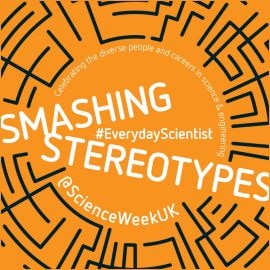-
Smashing science stereotypes



Smashing science stereotypes
3M and the British Science Association have joined forces to celebrate everyday scientists with a new campaign to tackle stereotypes.
Smashing science stereotypes
3M and the British Science Association are joining forces to celebrate everyday scientists with a new campaign run during British Science Week, 6-15 March, to tackle stereotypes.
Smashing science stereotypes
3M and the British Science Association are joining forces to celebrate everyday scientists with a new campaign run during British Science Week, 6-15 March, to tackle stereotypes.
-

From Artificial Intelligence to mixology, the new campaign illustrates the diversity of science and scientists to encourage more people to engage with STEM (science, technology, engineering and maths) careers.
The ‘smashing stereotypes’ campaign, launched during British Science Week in March, encouraged STEM employees and researchers to share their stories about what they do in their day-to-day work – to highlight the diversity of the STEM workforce, the broad range of jobs and careers available, and that scientists are just like other people – using the campaign hashtag #EverydayScientist on social media.
Katherine Mathieson, chief executive of the BSA (British Science Association), said: “Each year during British Science Week, we are always hugely encouraged by the enthusiasm shown by schools and community groups across the country in running events and activities, but stereotypical images of scientists dominate our social media feeds. These include ‘crazy scientist’ shows, children dressed up in lab coats, goggles and crazy hair wigs and sometimes even gendered costumes for the boys and girls. While this can be an engaging (and identifiable) hook for children, we want young people to see that science is so much more than this."
To address this, the campaign highlighted the diversity of the people who work in science, in both industry and academia, and the diverse range of roles within – and paths into – the STEM sector.
Dr Jayshree Seth, 3M’s global chief science advocate, said: “3M is working to inspire and encourage more people from under-represented groups to learn more about science and the full range of science related careers that can help them make the world a better place to live. We also want to break down barriers and myths; last year our global State of Science Index found that a third of people thought that science is ‘for geniuses’ and many believe that traditional science careers ‘are not satisfying’.
“We need to tackle these societally-entrenched stereotypes of scientists and scientific careers, because we face a whole host of global challenges in the coming decades. We need diverse thinking, creative thought processes and everyone to have a seat at the table (including women and minorities), to understand how to tackle these challenges and build a more sustainable future.”
The campaign highlighted case studies featuring a number of 3M employees.
Dr Claire Donoghue, an AI (artificial intelligence) technical team leader and one of the 3M employees featured in the campaign, creates AI and computer vision concepts to develop new products that improve peoples’ lives.
“When I was young, I had no idea this type of job would be available,” she said. “Technology is constantly advancing, and we’ve not yet imagined all the things that will be possible. There will be careers in tech that we can’t currently foresee, so it’s essential that tech roles attract a diverse workforce to generate the creative ideas of the future.”
Dr Claire Donoghue, an AI (artificial intelligence) technical team leader and one of the 3M employees featured in the campaign, creates AI and computer vision concepts to develop new products that improve peoples’ lives.
Progress is being made, with the Women Into Science and Engineering (WISE) 2019 Workforce Statistics report showing we have reached one million women in core-STEM occupations. However, there is still a way to go as the same report also highlighted that the proportion of tech roles filled by women has flatlined at 16 per cent since 2009 – so further action is needed to encourage more women to get into a category of jobs that make up a quarter of the STEM workforce.)
Engineering UK’s State of Engineering report 2018 shows there is work to do in supporting ethnic minorities in STEM careers. With stats showing only 8.1 per cent of workers in the engineering sector were from ethnic minority groups, compared with 12.7 per cent in non-engineering sectors, and 12.2 per cent of the broader population.
The BSA believes that entrenched social stereotypes of science and scientists are fuelling this challenge and hopes that the ‘smashing stereotypes’ campaign, in conjunction with 3M, will catalyse a much more diverse and inclusive conversation about who scientists are, what they look like, and what they do.
-
